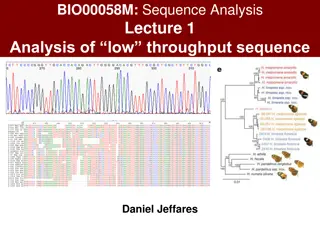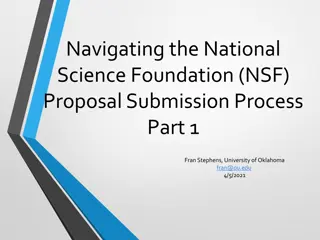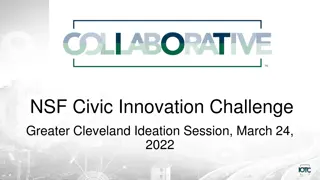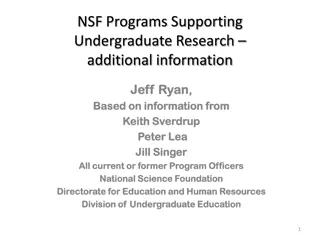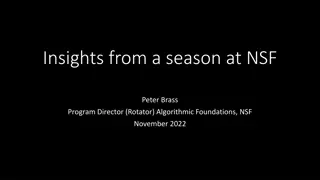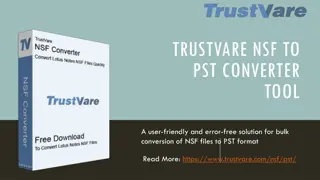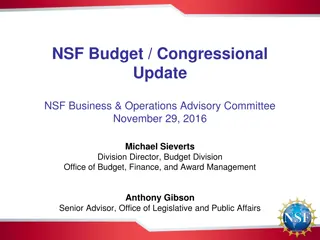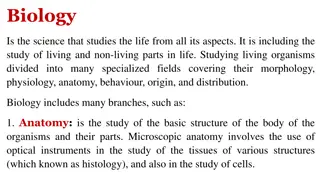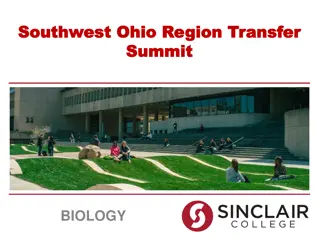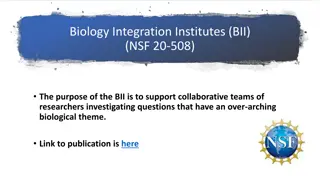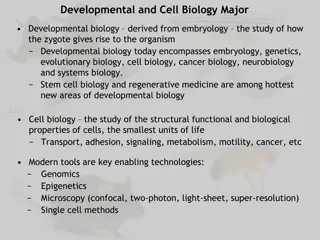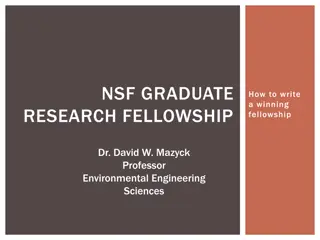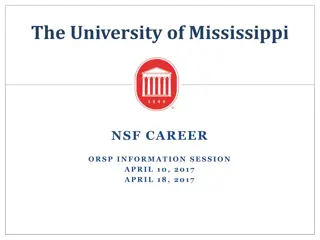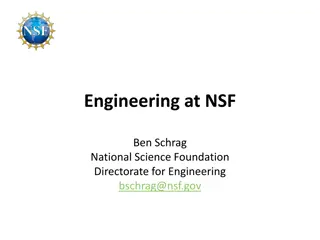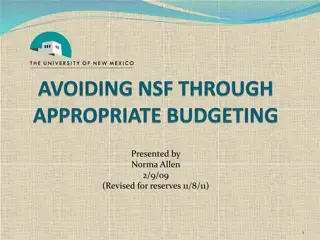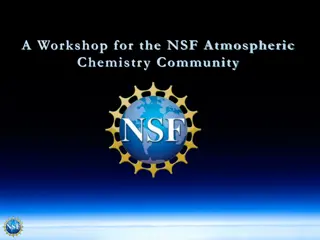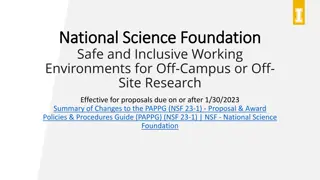Important Updates and Opportunities in Environmental Biology from NSF
Discover key information about upcoming events, funding opportunities, and ways to engage with the Division of Environmental Biology (DEB) at NSF. Stay informed on virtual office hours, blog posts, news updates, and recent funding opportunities to enhance your participation in conservation science and research endeavors.
Download Presentation

Please find below an Image/Link to download the presentation.
The content on the website is provided AS IS for your information and personal use only. It may not be sold, licensed, or shared on other websites without obtaining consent from the author. Download presentation by click this link. If you encounter any issues during the download, it is possible that the publisher has removed the file from their server.
E N D
Presentation Transcript
Division of Environmental Biology Virtual Office Hour Things I wish I learned earlier about NSF! Please submit questions via the Q&A button available to you on Zoom. Please set to Send anonymously 1
Welcome! Division of Environmental Biology NSF staff in attendance today: Jeremy Wojdak (host) Population and Community Ecology Chris Balakrishnan Systematics and Biodiversity Science Kim Hughes Evolutionary Processes Kendra McLauchlan Ecosystem Science Facilitators Megan Lewis, Christina Washington, and Bill Lawson 2
DEB Virtual Office Hour DEB Office Hours: second Monday of each month, 1-2pm Eastern Upcoming Topics: Macrosystems Biology and NEON-Enabled Science (MSB-NES) Welcome to DEB Partnership to Advance Conservation Science and Practice (PACSP) Update Introduction to the Directorate for Technology, Innovation and Partnerships (TIP) September 11: October 16*: November 13: December 11: *indicates time and date change 3
DEB Blog posts upcoming topics, registration, and recap posts https://debblog.nsfbio.com/office-hours/ 4
BIO News and Updates Visit www.nsf.gov and scroll down until you see the Sign up and social media banner, click on the yellow box, and follow the prompts. Volunteer to review: DEB: https://www.surveymonkey.com/r/DEBexpertise 5
Recent Funding Opportunities Find links to all recent solicitations and DCL at the left side of the BIO webpage under Funding Remember Many BIO solicitations have no deadlines and no submission limits. NSF 23-549 Division of Environmental Biology Core Programs - No deadline NSF 22-591 Opportunities for Promoting Understanding through Synthesis (OPUS) No deadline NSF 22-504 Macrosystems Biology and NEON-Enabled Sciences (MSB-NES) Deadline Nov 13 NSF 20-579 Dynamics of Integrated Socio-Environmental Systems (DISES) Deadline Nov 15 NSF 22-513 Organismal Response to Climate Change (ORCC) Deadline Nov 21 DCL 23-055 Bioinspired Design Collaborations to Accelerate the Discovery-Translation Process (BioDesign) DCL 23-092 Dear Colleague Letter: Availability of Earth Observation Data for NSF-Funded Researchers DCL 22-122 Planning Proposals to Catalyze Innovative and Inclusive Wildland Fire Science through Diverse Collaborations BIO 18-001 Biological Sciences Temporary/Rotator Program Officer 6
***New DEB Core Program Solicitation*** NSF 23-549 Data Management Plan: New guidance for specimen management. IntBIO Track: An Integrative Research in Biology (IntBIO) track invites submission of collaborative proposals to tackle bold questions in biology that require an integrated approach to make substantive progress. must span two or more sub-disciplinary boundaries in biology Projects suitable for review in a single existing BIO program should be submitted to that program (i.e., and not IntBIO) Small Grants: Complete research projects, up to $200,000 Safe and Inclusive Work Environments for off-site research required upon submission**** Check out the DEB Blog for more information 7
Learning the culture of NSF Participation Proposal submission Receiving reviews/ panel Summaries Award management Reports, requests, supplements Writing ad hoc reviews Panelist service Formal documentation Proposals & Awards Policy and Procedures Guide (PAPPG) Solicitations Dear Colleague Letters Research.gov/ Fastlane systems NSF outreach Blogs Virtual Office Hours Conferences Individual meetings with program officers 8
NSF is a customer service-oriented organization Myth: Program officers are too busy to talk with people about their grant ideas. Truth: PO s welcome PI emails and frequently meet via Zoom to discuss proposals, awards, even nascent ideas, and we enjoy it! Myth: NSF loves to say no. Truth: Limited budgets and high proposal pressure mean we must decline many submissions, but POs are deeply interested in fostering the success of the community. Providing funding calls that match where the community/research is going and opportunities for PIs to improve their submissions Listening to emergent obstacles/openings from people doing the work Myth: NSF is a monolith. Truth: There is tremendous diversity in process, emphasis, and expectations. Think adaptive radiation! 9
Preparing to submit a proposal Which solicitation? Be objective and honest with yourself It is very common for someone to love their idea, and convince themselves it fits (i.e., is responsive to) any solicitation. A great idea submitted to the wrong program can fail. Revising a draft before submission: Be strategic with your friendly reviews Give people specific tasks that honor their expertise Big picture colleague? Point them to your conceptual framework Disciplinary expert? Point them to your methods Helps avoid mere copy-editing reviews Struggling with the process? You are not alone! A great resource for proposal submission and grant administration advice are the websites published by SRO s of research-intensive institutions. 10
Getting reviews back after a proposal submission If your proposal went to panel, the panel summary should be given more weight than individual reviews. Should represent a comprehensive assessment of the factors that mattered for the recommendation. Some critiques in individual reviews, if not mentioned in the panel summary, may not have been viewed BY THE PANEL as that important. Sometimes a review is off-track that doesn t mean the panel, or the program officers accepted it as valid without question. If you find yourself But we said that on page 11!!! Didn t they read!?!? It probably means you can improve the clarity of your communication. Make that your default assumption. 11
Award administration: Congratulations! Now the real work begins . Reporting Due vs. overdue Download the template on day one, know what you ll need to collect and report, makes yearly reports a breeze Supplements Many programs now ask that you include REU/RET/ROA/RAHHS supplements in the original proposal Less work for everybody, and the desire to include these participants is easy to anticipate Successful supplements are usually tied to core NSF priorities Broadening participation Workforce Needs of the scientific community Some needs are emergent Career-Life Balance REPS Accomplishment/opportunity based 12
Award administration: Congratulations! Now the real work begins . Notifications and Requests No-cost extensions Change in scope/PI/methods/ person-months allocated Delays/problems 13
Questions? Submit your questions via the Q&A box on your screen and set to Send anonymously Upvote questions by clicking the thumbs up icon next to the question you most want answered 14




